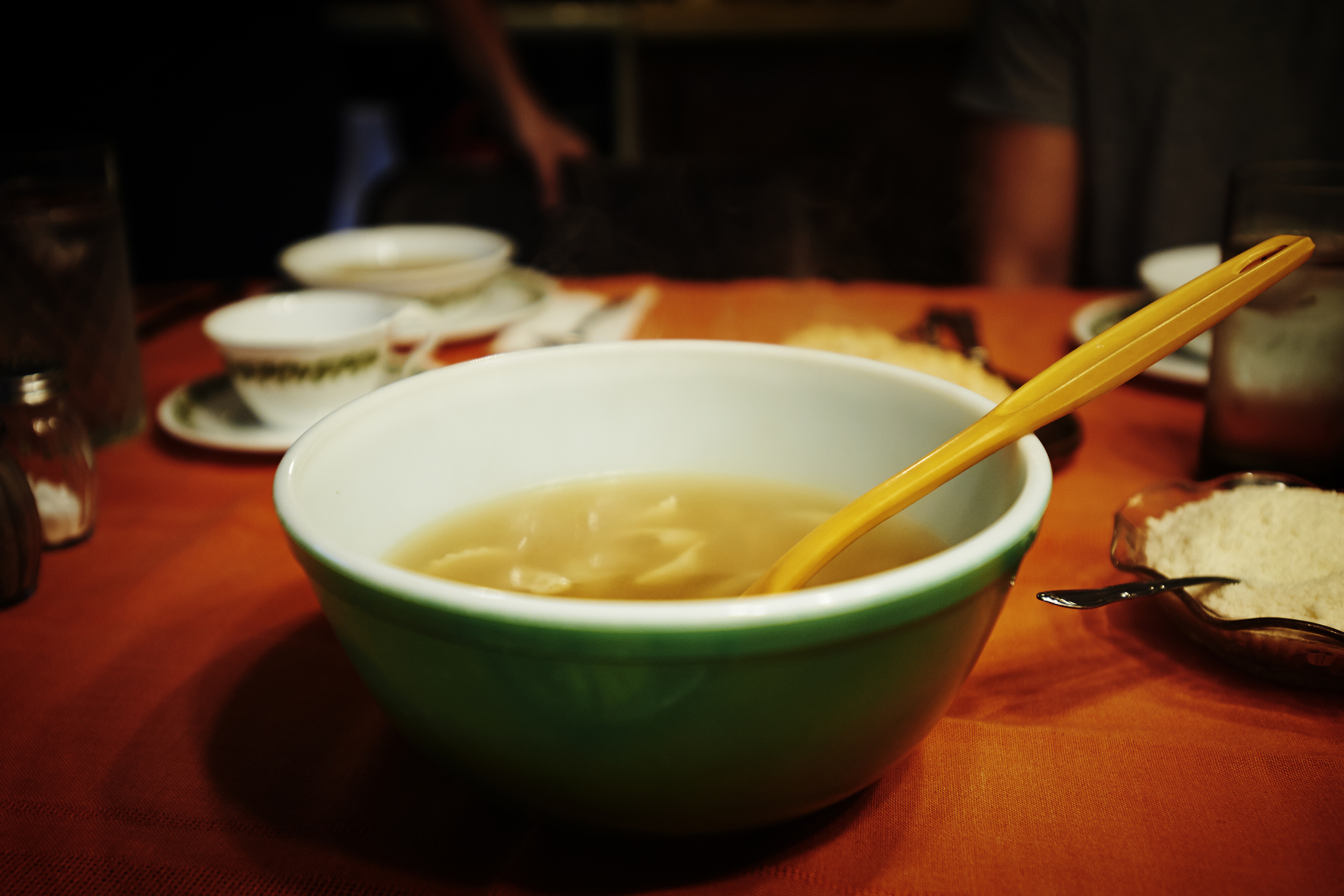

Fosca Painter Page
Fosca Painter Page
Fosca Painter
“When you don’t really have anything, you don’t miss anything”
HOME COOKING & A LOVING FAMILY
The tantalizing aroma burst from the kitchen as soon the front door opened to reveal a woman busily working over the stove. The table was set with traditional nut rolls, pizzelles, and her specialty, “raviolis in soup.” Fosca Palamidessi Painter was in the middle of creating one of her signature meals.
She just finished making tiny raviolis, no bigger than one inch, as we walked in the house. They cooked in steaming chicken broth. She is known to make close to 5,000 ravioli during the Christmas season for her family and we were only moments away from receiving some of them.
We all sat down to a light lunch before filming. Fosca entertained the group with her easy conversation, lighthearted jokes, and quick wit. She has a bright and spunky personality, which she used to quickly make everyone feel comfortable. She laughed and explained that everyone must think that “Fosca” is a disease instead of her actual name.
Fosca Palamidessi was the last of three children born to Pia Biondi Palamidessi and Angelo Palamidessi in Creighten, PA. Her parents were both born in Chiesina Uzzanese in Tuscany, Italy. Angelo came to America in the early 1900s to work in the coal mines, but when WWI broke out, he had to return to Italy to fight in the war.
It was during this trip that Angelo and Pia met and fell in love. Shortly after, Pia, at age 21, came to join Angelo in America. The couple came by train to Creighton, PA, a small mining town and predominantly Italian community across the Allegheny River from New Kensington.
Although they were very poor growing up, Fosca tells us that she had a pleasant childhood.
Fosca recalls happy times spent together with her sister Orestina, her brother Aldo, and her parents. Her father would make prosciutto and wine in the basement and hunt for mushrooms when home from work in the mines while her mother would cook delicious meals on the coal-burning stove, make fresh bread twice a week, fried dough and pizza being the accompanying treat, and sew all of her clothes down to her undergarments.
Pia was quite the avid seamstress.
Fosca reminisces about the close-knit Italian community in Creighton. She recalls the Italian men that played bocce at the Italian club on the weekends, the dances held at the Italian club with dinners and three-piece bands, the hand-dipped ice cream cones at Mr. Norman’s drug store, the small Accai grocery store that sold penny candy, and the various peddlers that would come around: Mr. White, the ice man making deliveries two times a week for twenty cents—Pasquale bringing back goods from the Pittsburgh Strip—the knife sharpener ringing his bell—and the man selling live chickens that her mother would butcher and cook up on a Sunday.
This happy time was interrupted in 1935 when her father was paralyzed in a mining accident in the Renton Mine when a large lump of coal fell on his back.
Her mother’s workload multiplied as she took in sewing and washings to make ends meet for the family. The Italian community rallied to help the family, especially when Angelo died six years later in 1941.
Fosca was a good student and co-valedictorian at East Deer High School in 1946. Her dream was to be a teacher, but the family could not afford to send her to college. Instead, her sister paid for her to go to stenotype school in Pittsburgh.
In 1947, she started working as a secretary to the general manager of the National Lead Company that fabricated Dutch Boy paints and titanium on the North Side, travelling by bus every day.
It was on this bus that she met John Painter, who was also riding the bus to Etna while working as an assistant manager at G.C. Murphy. The bus driver, Mr. Vigilante, encouraged their first encounter, and soon after they started dating in 1948.
John had finished his tour of Europe and Asia as a naval medic in WWII, returning on the ship that brought the flag-raisers of Iwo Jima home to San Francisco. John’s dream was to become an actor for which he obtained a scholarship to attend Ithica University, but his staunch mother forbade it. After one month of dating, John wanted Fosca to consider marriage.
She decided that he was worth the gamble, and they eventually married in 1951.
As they started their family of three children, Fosca quit her secretarial job in 1954. Fosca’s mother, Pia, remarried another man, Giuseppe, who owned a beer garden in West Tarentum where Pia took over as the main cook. Pia died in 1978, but not until she had visited her home in Italy twice.
Fosca’s husband, John, loving father, grandfather, gardener, and amateur actor extraordinaire, died of cancer in 1999.
Fosca’s vivid memories of the Italian community in Creighton, Pennsylvania, are captivating, and we can admire the resilience of her and her family. The beautiful thing about Fosca is her endless positivity and the joy with which she faces life, no matter what the obstacle or occasion.
She loves animals and nature; she embraces life, and above all she treasures her family.





